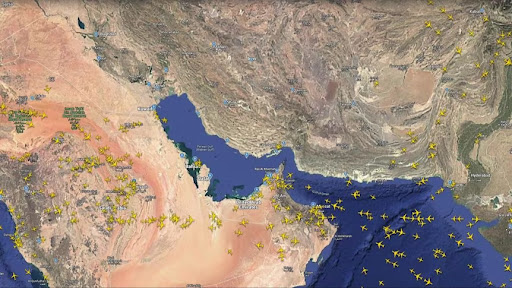The Iran Israel Conflict has triggered a major disruption in global air travel, with over 750 international flights cancelled due to rising tensions and airspace closures across West Asia. This sharp escalation has had a direct impact on the aviation sector, especially after the United States carried out airstrikes on Iran, prompting emergency decisions by several nations to shut down their airspace.
West Asia Shuts Airspace Amid Iran Israel Conflict
The Iran Israel Conflict began to intensify around June 12, when missile strikes were exchanged between the two nations. In a swift response, major West Asian countries decided to close their airspace to commercial flights. The situation worsened when the United States launched targeted strikes on Iran’s nuclear sites between Saturday night and early Sunday morning.
Following the U.S. strikes, Iran retaliated with a missile attack on the U.S. Al Udeid Air Base in Qatar on Monday. Just hours before the attack, Qatar had already shut down its airspace, while the U.S. and U.K. issued emergency shelter advisories to their citizens in the region. The United Arab Emirates (UAE) also announced a temporary suspension of all flight operations for several weeks.
750+ Flights Cancelled as Iran Israel Conflict Escalates
As a result of the Iran Israel Conflict, global airlines began cancelling flights due to security concerns. According to FlightAware’s real-time tracking data, more than 705 flights had already been cancelled by Monday afternoon, with Dubai International Airport alone accounting for 75 cancellations. Air India had the highest number of cancellations, with 38 flights scrapped from its schedule.
Airlines Respond Proactively
Amid the rising security risks caused by the Iran Israel Conflict, several international airlines took immediate and precautionary actions to ensure the safety of their passengers and flight crews. Singapore Airlines was among the first to respond by suspending its flights to and from Dubai starting from Sunday through Wednesday. The decision was made in view of the volatile airspace and increasing tensions in West Asia. Similarly, British Airways cancelled its scheduled services to Doha, the capital of Qatar, for the same period, citing passenger safety as a top priority. Meanwhile, Air India took a more extensive step by announcing the suspension of all flight operations to and from West Asia, North America, and the eastern coast of Europe until further notice. In addition to that, Air India rerouted its flights from North America to India so they could avoid entering airspaces that had been declared unsafe or restricted due to the conflict. These measures reflect the aviation industry’s serious concern over the safety implications of the Iran Israel Conflict and highlight their proactive stance in preventing potential incidents.

Dubai Airport Most Affected
Among all the global airports, Dubai International Airport was the worst hit. Out of the total 705 flights cancelled globally, 75 were from Dubai, including 38 Air India services. Experts argue that such airspace restrictions and reroutes are critical for passenger safety amid ongoing military conflict.
Aviation Experts Back the Airlines’ Decision
Aviation safety specialists have expressed support for the flight suspensions due to the Iran Israel Conflict.
Hassan Shahidi, President & CEO of the Flight Safety Foundation, stated that nations must guarantee that their airspace is safe for civilian air traffic. “Qatar did the right thing by closing its airspace amid escalating conflict,” he said.
Shahidi also reminded the world of Malaysia Airlines Flight MH17, which was downed by a missile, emphasizing that a repeat of such tragedies must be avoided.
Similarly, Ian Petchenik, Communications Director at FlightRadar24, said, “The cancellation of flights and closure of airspace are strong indicators that airlines, flight crews, and air traffic controllers are prioritizing safety during the Iran Israel Conflict.”
The Iran Israel Conflict has severely disrupted global aviation, grounding hundreds of flights and forcing countries to seal their skies. As tensions remain high, airlines continue to monitor the situation closely, prioritizing safety while adapting flight routes to avoid active conflict zones. The aviation industry braces for prolonged disruptions if the Iran Israel Conflict escalates further.
Iran Retaliation for US Strikes: Trump Hints Regime Change Amid Oil Crisis, Rising Tensions



[…] Iran Israel Conflict Disrupts Over 750 Flights: Global Aviation Crisis Unfolds […]